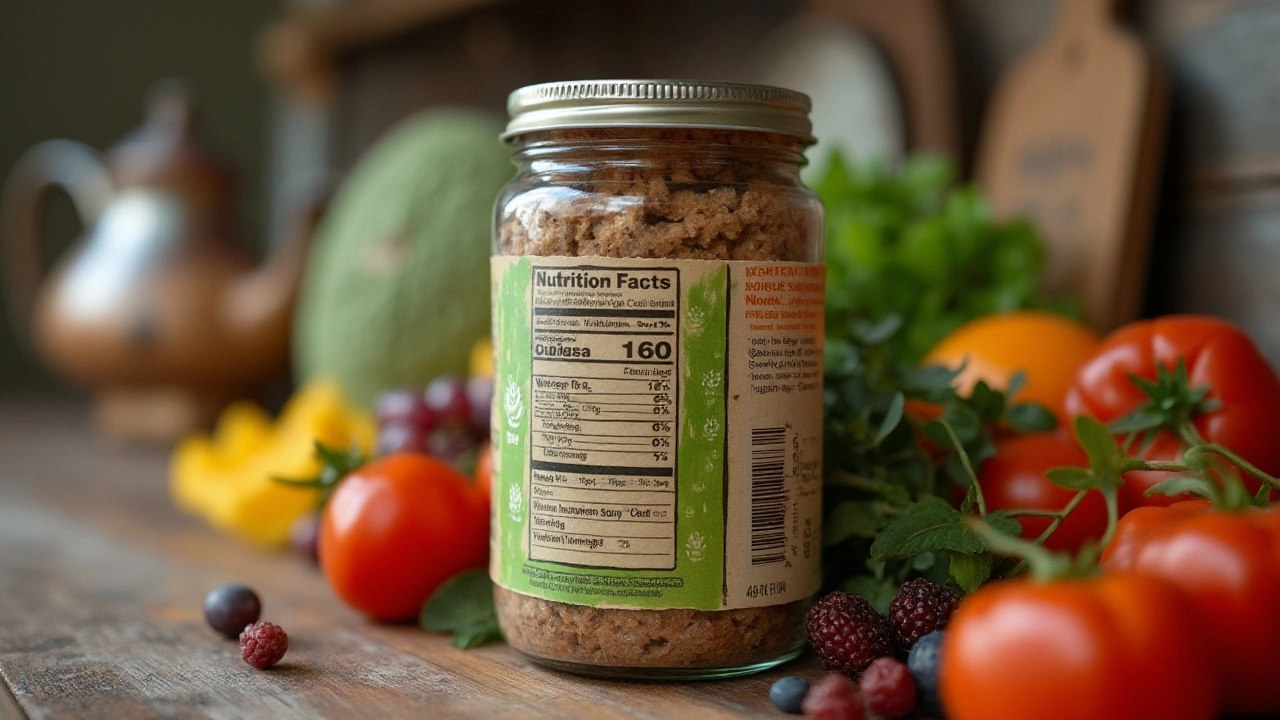In the realm of veganism, countless foods are celebrated for their health benefits, but it's easy to forget that not everything labeled vegan is automatically good for you. The rise of veganism has brought countless processed and convenience foods to store shelves, some of which are far from nutritious. As consumers increasingly demand plant-based alternatives, companies have responded by offering a slew of ready-made snacks and meals that, despite being animal-product-free, are chock-full of sugars, salts, and unhealthy fats.
These processed vegan foods can often distract from the core of the plant-based lifestyle, which inherently promotes fresh, whole, and unprocessed ingredients. It's important to be mindful of these options since they can sometimes sabotage a well-intentioned dietary regimen. Not all plant-based products truly deserve the health halo they might portray on their packaging. Through awareness and informed choices, it's possible to enjoy the benefits of a vegan diet while avoiding its pitfalls.
- Understanding Vegan Processed Foods
- The Sugar Trap in Vegan Sweets
- High-Sodium Vegan Snacks
- Trans Fats and Vegan Packaged Goods
- Reading Labels: What to Look For
- Tips for Healthier Vegan Choices
Understanding Vegan Processed Foods
When diving into the realm of veganism, many people are surprised to find just how many vegan foods fall under the category of 'processed'. The term processed, in a dietary context, often pertains to foods that have been altered from their original state, typically through methods involving additives such as preservatives, flavorings, and colorings. These changes often extend product shelf life or enhance taste, but they can also result in a considerable loss of nutrients. Among vegan junk food options, you might encounter crispy chips crafted from genetically altered potatoes or brightly colored candies that derive their hues from artificial means rather than fruits or vegetables.
In recent years, vegan processed foods have taken the world by storm. In fact, the global vegan food market was valued at over $14 billion USD in 2021, exemplifying how widespread the movement has become. However, processed foods, even within this niche, can often sidestep health benefits traditionally associated with a plant-based diet. Some ready-to-eat vegan meals might resemble their animal-derived counterparts in taste, but not necessarily in caloric or nutritional value. This mimicry often relies heavily on sugar and salt, leading to products that, while animal-free, may not necessarily be guilt-free in terms of health.
In a revealing testimony to the complexity of vegan options, health expert and nutritionist Dr. Jane Forbes states,
"While the vegan ethos rightly focuses on cruelty-free living, products infused with chemicals and excess sodium may unknowingly compromise health. Consumers should be discerning, looking beyond labels to truly understand the nature of their food."This insight underscores the necessity for consumers to retrain how they read food labels, looking beyond what meets the eye. It’s not uncommon to find items rich in unhealthy fats; replacing dairy with oils can significantly alter the fat content of these 'nutritious' alternatives.
There’s a growing need for vigilance among vegan enthusiasts, in particular regarding what constitutes whole foods versus processed items. To fully grasp this, consider the journey soybeans undergo to become soy burgers, sausages, or nuggets. Trans fats, which are unsaturated fats that have been processed to be solid at room temperature, can surprisingly find their way into various vegan packaged goods, despite the healthier image many associate with them. Labels might shine with the allure of buzzwords like 'gluten-free' or 'organic', but the fine print might tell a different story.
The Sugar Trap in Vegan Sweets
Vegan sweets have emerged as a popular alternative to traditional desserts, captivating the taste buds of those adhering to a plant-based diet. These treats often boast ingredients free from animal products, presenting an ethical choice for dessert lovers. However, lurking beneath the delightful exterior of many vegan sweets is an abundance of sugar that might surprise even the most diligent of health-conscious eaters. From vegan cookies to dairy-free ice creams, sugar is frequently used to compensate for what might be perceived as missing indulgence—that creamy texture or rich flavor.
In the quest to deliver a comparable gustatory experience, manufacturers pack these sweets with refined sugars, which, while technically vegan, offer little nutritional benefit and can contribute to various health issues. A critical distinction here is that just because something is plant-based, it doesn’t always mean it’s healthy. In fact, many vegan snacks contain as much, if not more, sugar than their non-vegan counterparts. This trend is evident across numerous products lining grocery store shelves, aiming to capture the essence of traditional confections while maintaining a cruelty-free label.
"Many assume that vegan products are inherently healthier," notes Dr. Jane Simons, a renowned nutritionist, "but without careful label scrutiny, it’s easy to fall into the sugar trap of vegan sweets."
One must exercise caution and diligence when selecting vegan alternatives, taking the time to read ingredients and nutritional facts. Types of sugars typically found in these sweets include cane sugar, corn syrup, and natural syrups like agave, all of which, when consumed in excess, can exert similar adverse effects on the body. There’s a fine balance to be struck between enjoying these delicious, plant-based goodies and maintaining a healthy diet. Choosing sweets that use natural sweeteners like dates or coconut sugar might offer a slightly healthier option—not without their own caveats but a step towards moderation.
The Hidden Sugars in Plant-Based Desserts
Hidden sugars can manifest in places one might not expect, such as granola bars that are often promoted as a healthy snack. These so-called health bars might sneakily elevate daily sugar intake levels, particularly when marketed in conveniently portioned packaging that encourages overconsumption. When selecting sweet snacks, one useful approach is to look for labels with minimal ingredients or prepare homemade versions where sugar levels can be controlled. Simple swaps and substitutes like using ripe bananas for sweetening or experimenting with nut butters can deliciously reduce added sugars.
Creating a strategy for reducing sugar intake involves becoming an informed consumer. Start by researching the various names sugars can take on ingredient labels—evaporated cane juice or barley malt can often fly under the radar. Recognizing these disguises empowers consumers to make better choices. Ultimately, the key to enjoying vegan sweets responsibly lies in understanding what they truly contain and making adjustments to how frequently such items are included in one’s diet. In doing so, enthusiasts can relish the splendor of these indulgences without compromising their health goals.

High-Sodium Vegan Snacks
The quest for convenient and tasty plant-based delights often leads individuals to the alluring world of vegan snacks. Yet, behind the appealing packaging and enticing slogans lies an unfortunate surprise: many vegan snacks are loaded with sodium. This sneaky culprit can wreak havoc on health, contributing to issues such as high blood pressure and increased risk of heart disease. The crunch of chips, the savory allure of pretzels, and even certain granola bars can contain as much sodium as their non-vegan counterparts, if not more. It comes as a surprise for many who switch to vegan for health reasons, believing that plant-based means inherently healthier.
The challenge lies in the preservation and flavor enhancement of processed foods. Producers often lean heavily on salt to maintain taste and shelf-life. While seaweed snacks and vegetable chips might seem like wholesome choices, they can be surprisingly high in this mineral. For instance, some seaweed snack packs may contain over 400 milligrams of sodium per serving — nearly 20% of the recommended daily intake! According to the Australian Society of Nutrition, ultra-processed foods contribute to over 70% of sodium intake in the diet.
Choosing healthier options requires vigilance and a bit of sleuthing. Reading nutrition labels becomes crucial in making informed decisions. Look beyond the front-of-package claims and delve into the finer print on the back. Opt for snacks that state sodium content of under 140 milligrams per serving, classified as low-sodium according to dietary guidelines. Homemade snacks become a rewarding alternative, allowing you to control the amount of salt in your diet. Whether it’s air-popped popcorn seasoned with herbs or a trail mix made from scratch, there's pleasure in knowing exactly what goes into your food. Jane Smith, a nutritionist specializing in plant-based diets, advises:
"Reducing sodium intake doesn't mean sacrificing flavor. Spices and herbs can add fascinating dimensions to snacks without the added salt."
Trans Fats and Vegan Packaged Goods
At first glance, it may seem contradictory to find trans fats in vegan packaged goods, given that trans fats are often associated with animal-based butter or margarine. Yet, the reality is somewhat surprising and quite pervasive. Many processed vegan foods rely on hydrogenated oils, which are a key source of trans fats. These oils are often used to mimic the texture and flavor typically associated with non-vegan products, ensuring that vegan counterparts remain just as delicious and appealing to a broader audience. This tactic, while understandable from a business perspective, can undermine the health benefits many seek from a vegan lifestyle.
In the realm of vegan junk food, items such as cookies, crackers, and frozen meals can be some of the most common carriers of these hidden fats. The inclusion of trans fats helps to increase the shelf life of a product, which is appealing to manufacturers but not as beneficial for those consuming them. Trans fats have been heavily scrutinized for their adverse impacts on health, including raising bad cholesterol levels and increasing the risk of heart disease. Despite bans in many countries on the use of artificial trans fats, naturally occurring trans fats from hydrogenated oils often slip through the regulatory cracks.
According to a statement by the World Health Organization, 'Eliminating artificially produced trans fats is a simple preventative health intervention with massive health benefits.'The emphasis on eliminating these fats highlights not just global health concerns but also the responsibility of food producers to ensure healthier alternatives without compromising flavor. However, labels can be deceptive, and consumers might overlook trans fats, especially within vegan products marketed as 'health snacks.'
For the informed consumer, the solution lies in reading labels meticulously. Vegan diet enthusiasts should look for terms such as 'partially hydrogenated oils' or 'vegetable shortening' on ingredient lists. These signal the potential presence of trans fats. Often, products may claim to be 'trans fat-free' due to a loophole that permits such a claim if there is less than 0.5 grams per serving. Yet, repeated consumption of such servings throughout the day can accumulate to concerning levels. Knowing this, it's wise to aim for whole, minimally processed vegan foods, cutting down the risk of inadvertently consuming unhealthy fats.
The landscape of plant-based diet options is expanding rapidly, and consumer vigilance is crucial. Opting for fresh ingredients and reducing dependency on packaged goods can substantially decrease the exposure to these unwanted trans fats. As veganism continues to evolve, so too should our awareness of what constitutes a truly healthy product. Making informed choices not only benefits our individual health but also supports a movement towards genuinely healthier vegan processing practices.

Reading Labels: What to Look For
Deciphering food labels can be a rewarding endeavor when navigating the world of vegan foods. It's akin to peeling back the layers of a story, revealing the true content hidden beneath clever marketing. When you're reaching for that enticing pack at the grocery store, it's crucial to delve into the label to uncover what's truly inside. Begin with the list of ingredients. Products with extensive lists filled with unrecognizable names might be a red flag for extensive processing or the inclusion of chemically derived additives. The golden rule is that fewer ingredients often indicate a more natural product.
Sodium levels are another significant number to scrutinize. Processed vegan foods can be surprisingly high in salt, sometimes meeting or exceeding the daily recommended intake in just one serving. The same vigilance should apply to sugar content. Words like 'cane juice,' 'corn syrup,' and 'fructose,' often masquerade as healthier-sounding alternatives but are simply sugar in disguise. According to a report by the American Heart Association, sugar intake should be minimized to reduce health risks, even within a vegan diet.
"While plant-based diets are generally higher in carbohydrates, it’s vital to choose the right ones," says Dr. John Purcell, a renowned nutritionist.
Don't overlook the fat content either. Not all fats are created equal. Check for trans and saturated fats — both of which can lurk in unexpected places like vegan butters and cheeses. If the label lists hydrogenated oils, put it back and keep going. Spotting the healthier fats, like those from nuts and seeds, adds a quality perspective to your selection. For those mindful of their calorie intake, be aware that vegan labels can be deceiving; what appears healthy at first glance might be calorie-dense.
Beyond macro content, watch for artificial preservatives or colorants. Labels that highlight natural preservatives like vinegar or lemon juice tend to be the safer choice over synthetic ones. Meanwhile, on the nutrition facts panel, understand the serving size and compare it to what you typically consume. Misjudging this can easily derail dietary goals. Vegan junk food doesn’t have to be inevitable if transparency and due diligence become habitual during shopping. This way, the juggle between convenience and health finds a suitable balance, offering you both satisfaction and well-being.
A practical approach is to make use of apps and online resources that help interpret nutritional information. Embrace technology as a tool in this veritable treasure hunt along the supermarket aisles. It's all part of adopting a responsible and informed approach to enjoying a truly beneficial plant-based diet. Over time, this practice doesn't just become second nature but also enriches the holistic enjoyment of a vegan lifestyle.
Tips for Healthier Vegan Choices
Choosing to embark on a vegan journey opens up possibilities for tremendous health benefits and a more sustainable lifestyle. However, navigating the vast landscape of vegan options requires a discerning eye. The secret to thriving on a vegan diet lies in seeking foods that nourish and energize rather than just satisfy cravings temporarily. One of the profound ways to elevate your plant-based dining is focusing on whole foods. Whole, unprocessed foods deliver a bounty of nutrients, from fiber-rich legumes and leafy greens to vitamin-packed fruits and nuts. These foods are unarguably the stars of any healthy vegan diet, providing the body with essential vitamins, minerals, and antioxidants.
One actionable tip is to dedicate a portion of your diet to incorporating a rainbow of vegetables. The color variety in your meal not merely ensures a visually appealing dish but signifies a wide range of nutrients. When grocery shopping, bypass the lure of packaged snacks and instead frequent the fresh produce aisles. Joining a local community-supported agriculture (CSA) program might provide weekly deliveries of in-season veggies, which encourages you to expand your palate and try new, beneficial ingredients. Increasing the intake of raw foods is another strong recommendation as it helps retain the natural enzymes that may be lost during cooking processes. Raw nuts, seeds, and fresh juices make for excellent additions.
It's crucial to become an avid label reader. Many vegan snacks often harbor hidden sugar and salt levels akin to their non-vegan counterparts. Manufacturers sometimes sneak in additives to enhance flavor or prolong shelf life, but these can detract from the healthful aspects of a plant-based diet. Look for products boasting minimal ingredients and no artificial additives. This diligence extends to alternative milk choices as well. Beverages like almond and soy milk can sometimes contain gums and thickeners, so opting for products that contain simple, recognizable ingredients is generally a healthier choice. A statement from the well-known author, Michael Pollan, resonates here:
"Eat food. Not too much. Mostly plants."
Embracing homemade means can reduce reliance on processed stores. Try experimenting with making your own granola or energy bars to avoid the pitfalls of store-bought versions laden with sweeteners. Homemade meals grant control over ingredients and portions, empowering a wholesome dietary approach. Cooking in bulk can save time and ensure there’s always a nutritious meal on standby. Having homemade plant-based meals stocked up can significantly reduce the temptation to reach for quick yet unhealthy vegan junk food options.
Lastly, embracing fermented foods could be a game-changer for your digestive health and overall well-being. Foods like sauerkraut, kimchi, and miso are not only plant-based but also excellent sources of probiotics. Probiotics support gut health, which is a cornerstone of a strong immune system. Incorporating these regularly could prove invaluable in a vegan meal plan. To ensure you're staying on track, consider keeping a food diary to identify patterns and reveal areas for improvement. Tracking allows a clear view of progress and motivates toward consistent, healthy plant-based choices. Aware decisions today lay the groundwork for a healthier, more vibrant tomorrow.

